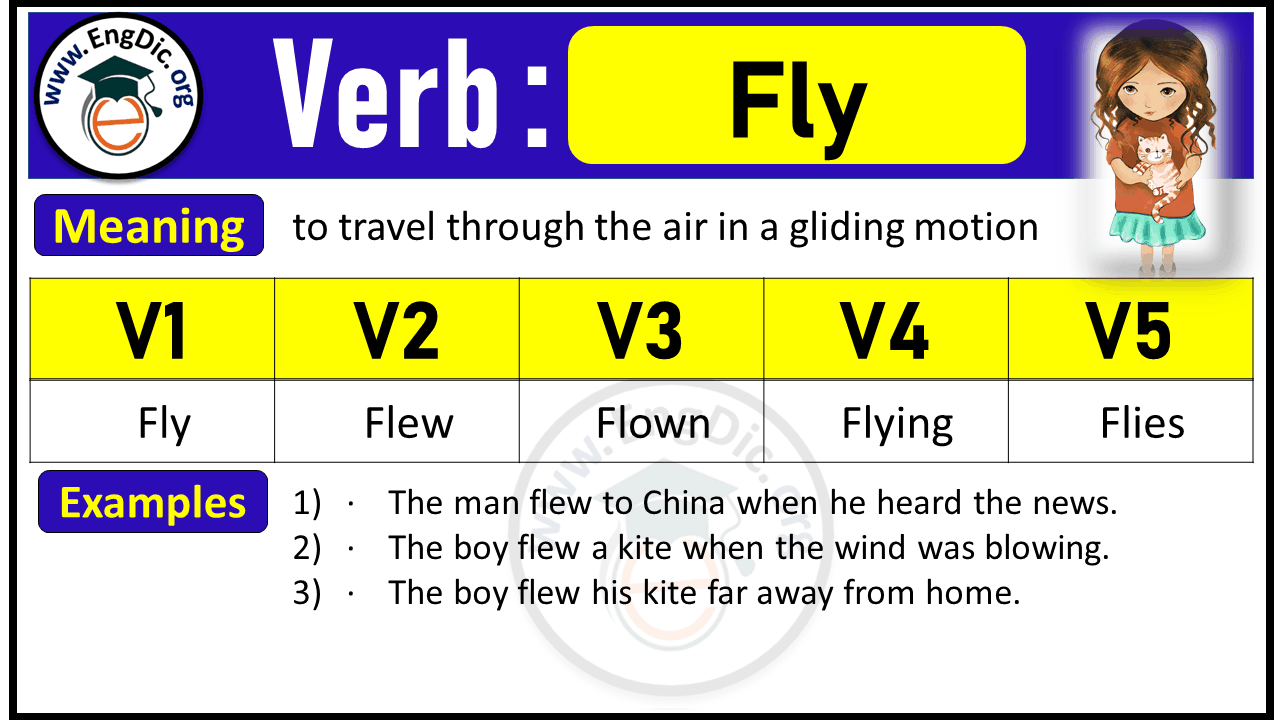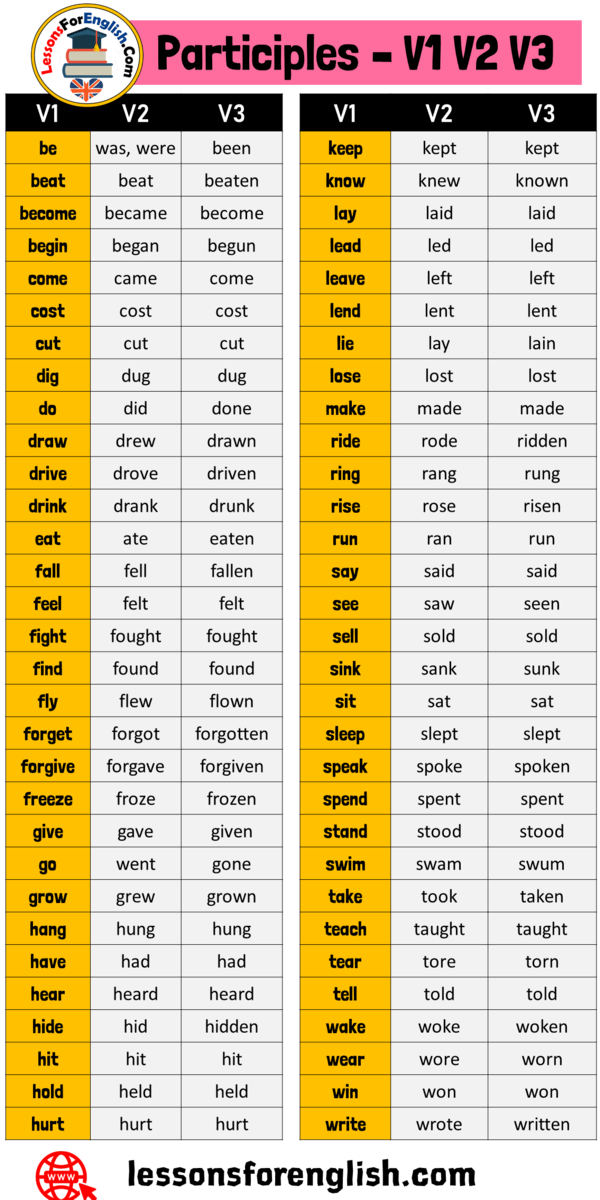
English V1 V2 V3, Definition, Examples and Detailed List Table of Contents V1, V2 and V3Where is
Like Past Simple, Past Participle, V1 V2 V3 Form of Like Verb; Like Meaning; approve, appreciate, enjoy, applaud V1, V2, V3, V4, V5 Form of Like Base Form Past Form Past Participle like liked liked Base Form s/es/ies ing Form like likes liking Synonym for Like approve appreciate enjoy applaud care be pleased with affect be attracted love fondle pet want request ask ask for require Opposite of.

Fly Verb Forms Past Tense and Past Participle (V1 V2 V3) EngDic
V1 - The base form of 'like' is 'like.' This is the form that you would use when you are speaking in present tense or in the infinitive. For example: I like ice cream. She wants to like running, but finds it difficult. V4 - The fourth form of 'like' is 'liking.' This form is used in combination with helping verbs to create.

Is Will A Verb PICTIONARY ACTION VERB SET (1) from A to D worksheet They have
Like V1 V2 V3, Like Past and Past Participle Form Tense Verb 1 2 3. admin 25 October 2023 General No Comments. Like V1 V2 V3, Like Past and Past Participle Form Tense Verb 1 2 3. Table of Contents. like; Synonyms; Example Sentences with like; like. Meanings; Having the same characteristics or qualities as; similar to.(preposition)

a cell phone displaying the work order form
V3 Past Participle. The V3 form is the same as the V2 form. The V3 form of this verb is 'liked'. 'Liked' is used in the case of Past Perfect Tense or Present Perfect Tense. If the question is in the Present Perfect Tense, we use the word like as 'have + liked' or 'has + liked'. The subjects I, you, we are used as 'have + liked'.

Feel V1 V2 V3 V4 V5 Base Form Past Simple Past Participle Form Of Feel Englishtivi Otosection
This list contains all the irregular verbs of the English language. Each entry includes the base or bare infinitive first, followed by the simple past (V2) form and the past participle (V3) form. Taking some time to make sentences using each irregular verb form will help you to use these verbs correctly when speaking and writing.

10 Irregular Verbs List, V1 V2 V3 Form in 2021 Irregular verbs, Verbs list, Verb
Live. Look. Loose. Lose. Liked is the past tense of the word like. Liked is the past participle of the word like. like past form, verb forms, v1v2v3, Infinitive.

REGULAR VERBS List in English V1 V2 V3 Accept Accepted Accepted Act Acted Acted Achieve Achieved
Like of Past Participle V3. The V3 form is identical to the V2 form. The V3 form is "liked". Liked is used in the past or present perfect tense. + In the present perfect tense, we use the word V1 as 'have + liked' or 'has + liked'. I, you, and we are used as 'have + liked'. 'has + liked' is used for he, she, and it.

English Participles, V1 V2 V3 List V1 V2 V3 be was, were been beat beat beaten became
Past Tense of Like, Past Participle of Like, V1 V2 V3 V4 V5 Form of Like Like means; Having the same characteristics or qualities as; similar to Verb V2 V3 V-es V-ing like liked liked likes liking Synonym Words With Like admire appreciate go for love adore approve cherish dig esteem exclaim fancy prize relish savor be gratified by Example Sentences with Like I think you like me. You like it.

1000 Verb List, V1 V2 V3 V4 V5 Form Verb List in 2023 Verb forms, Verbs list, English grammar pdf
like. Meanings; Having the same characteristics or qualities as; similar to. (preposition) Used to draw attention to the nature of an action or event. (preposition) Such as; for example. (preposition) Verb (V1) Past Tense (V2) Past Participle (V3) like.

FileLearner's License Application Form.png Wikimedia Commons
This is a list of some irregular verbs in English. Of course, there are many others, but these are the more common irregular verbs. You can test yourself with these fun irregular verbs quizzes. V1. Base Form. V2. Past Simple. V3. Past Participle.

V1 V2 V3 List in English Verbs list, Writing words, English vocabulary words
Like V1 V2 V3 V4 V5, Past Simple and Past Participle Form of Like Verb; Like Meaning; approve, appreciate, enjoy, applaud V1, V2, V3, V4, V5 Form of Like Base Form Past Form Past Participle like liked liked Base Form s/es/ies ing Form like likes liking Synonym for Like approve appreciate enjoy applaud care be pleased with affect be attracted love fondle pet want request ask ask for require.

Salt Ziua Profesorului minim look forms of verb Lipicios raport tiran
Like Verb Forms V1 V2 V3 . Base Form (V1) like: Past Form (V2) liked: Past Participle Form (V3) liked: s / es/ es (V4) likes 'ing' form (V5) liking . Hope you must have liked this post-Like Verb Forms In English, you also share it.

V2 YouTube
At school, students often learn by heart the base, past simple and past participle (sometimes called V1, V2, V3, meaning Verb 1, Verb 2, Verb 3) for irregular verbs. They may spend many hours chanting: sing, sang, sung; go, went, gone; have, had, had; etc. They do not learn these for regular verbs for one very simple reason - the past simple and past participle are always the same: they are.

V1 V2 V3 Verb forms List (PDF download) 300+ Words »
Verb form V2, the Past form of Verb, refers to an action/event that happened in the past. Usually, the past form of a verb is formed by adding "- " to the end of the root verb. For example: If a root verb ends with the letter " ," we only add "-. . For instance, verbs like. On the other hand, verbs such as "go" change completely.

Irregular Verbs 3 Forms Exercises BEST GAMES WALKTHROUGH
Table of irregular verbs - English Grammar Today - a reference to written and spoken English grammar and usage - Cambridge Dictionary

Pin on V1 V2 V3 Form of Verbs
Like V1 V2 V3 V4 V5 Simple Past and Past Participle Form: English is a most common language and its acceptance is also bigger than any other language in this world. For proper utilize of English, We need to know the proper uses of Words & their Verb form. Verb can transform from various way in real life. So Students, here in this post, We will.
